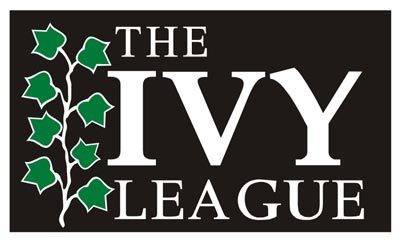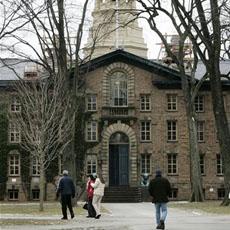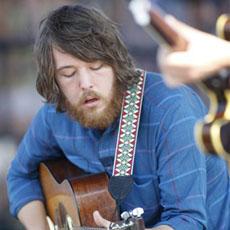
DOUG JOHNSON: Welcome to AMERICAN MOSAIC in VOA Special English.
(MUSIC)
I'm Doug Johnson. On our program this week, we play new music from Fleet Foxes...
And we answer a question about a term for a grouping of eight American schools.
(MUSIC)
Ivy League
DOUG JOHNSON: This week, we answer a question from New Zealand. Erin would like to know what the term "Ivy League" means and where it came from.
The Ivy League is a name for eight schools in the northeastern United States. All but one were established hundreds of years ago, when England had colonies in the area. The oldest schools are Harvard, Yale, Columbia, Dartmouth, Princeton, Brown and the University of Pennsylvania. The newest is Cornell, which was founded in 1865.
The term Ivy League can also be used to describe a sports grouping of the eight schools. The schools are also called the Ivies.
Many language experts believe that the term first appeared in the media. In the 1930s, a sports reporter called the schools in the grouping, the "Ivy League." The group also had an unofficial name -- "The Ancient Eight." Now both names are used. However, the National Collegiate Athletic Association officially uses the term Ivy League.

Why the reporter used the term is not completely clear. Some people say the term is linked to the ivy plant. And ivy does cover some of the grounds and buildings at the schools. Other people say the term dates back to when only four of the schools were part of the sports group. The number four was written in roman numerals, the letters "I" and "V." However, most historians say that explanation is incorrect.
The term Ivy League is sometimes said in a disapproving way. Some people think the eight schools and their students value themselves too highly. Admission to the schools is very competitive. As little as seven percent of students who seek admission are accepted.
The educational offerings of Ivy League schools are considered among the best and most demanding in the world. All eight schools are also private and extremely costly. A four year degree from Harvard, for example, can cost more than 200,000 dollars. Admission to an Ivy League school can sometimes be easier among people who are rich, powerful or are related to former students of the school.
(MUSIC)
Fleet Foxes
DOUG JOHNSON: The band Fleet Foxes met with immediate success with its first album in 2008. Billboard Magazine declared the record, also called Fleet Foxes, its Album of the Year. Critics from Rolling Stone compared the band to two great groups from the past, the Beach Boys and Crosby, Stills and Nash.
Recently, Fleet Foxes released its second album. Katherine Cole has more.
KATHERINE COLE: "Helplessness Blues" is the name of Fleet Foxes' new album. The name might represent the difficulties the band experienced when putting the album together. The group had completed all the songs, but decided against them during the production process. Band member Robin Pecknold told Pitchfork.com that he then spent a year struggling to write new songs.
Here is the title song from the album, "Helplessness Blues."
(MUSIC)

Robin Pecknold is the lead singer for Fleet Foxes. The six-member band is known for creating beautiful harmonies when they sing together. "Battery Kinzie" from "Helplessness Blues" is a good example.
(MUSIC)
Lead guitarist Skylar Skjelset and Robin Pecknold met in high school in the state of Washington. They both had musical parents. They also both loved musicians Bob Dylan and Neil Young. Robin Pecknold sounds much like Neil Young in the song "Grown Ocean."
(MUSIC)
Right now, Fleet Foxes is performing at cities across the United States. The band plans to go Europe at the end of May for a concert series there.
We leave you with Fleet Foxes performing "The Cascades" from its new album "Helplessness Blues."
(MUSIC)
DOUG JOHNSON: I'm Doug Johnson. Our program was written by Mario Ritter and Caty Weaver, who was also the producer.
Join us again next week for music and more on AMERICAN MOSAIC in VOA Special English.
International Folk Alliance showcases new talent
(來源:VOA 編輯:崔旭燕)
